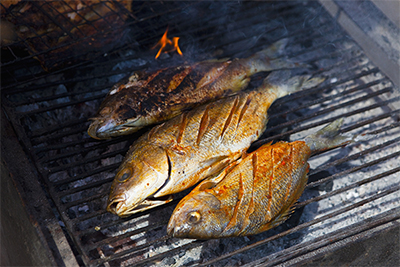
Memorial Day is on its way and in light of new CDC guidance, celebrations will likely commence this May 31st. Often gatherings of family and friends are centered around a grill. Cookouts are usually an easy meal for bariatric patients to work around as they are often centered around proteins.
One thing bariatric patients should be careful about is the temperature of grilled proteins. Oftentimes, cooks are less precise with their temperatures on the grill than they are when using their oven. This can lead to undercooked food, which is not just unappetizing, it can be a food safety hazard.
Bariatric patients, including gastric sleeve, gastric bypass, and lap band patients, can be at a greater risk for dangers related to food borne illness. It’s not so much that weight loss patients are more susceptible to foodborne illness, but the problem lies in the after effects of contracting a foodborne illness. Bariatric patients are more prone to suffer from dehydration due to their smaller stomach size and inability to handle large volumes of water or liquids to rehydrate. Suffering from nausea, vomiting, and diarrhea due to undercooked food (or food not held at the proper temperature) can be dangerous for weight loss surgery patients.
One way to limit this possibility is to know the proper temperatures to cook different meats to and actually check it with a thermometer. According to the USDA, these are the proper temperatures your meats should reach:
- Steak 145 ℉
- Chicken or turkey 165 ℉
- Burgers and sausage 160 ℉
- Fish 145 ℉
In addition to cooking proteins to the proper temperature, it’s important to keep cold foods cold. This is especially important for anything that has mayonnaise, like cole slaw. Better yet, skip the mayo based salads all together and opt for grilled veggies or a green salad instead to limit your calories. This can help you stay within your daily calorie limit and stay on track for your weight loss. Always important is to only eat foods and consistencies in the proper stage of your post op bariatric diet (see Dr. Shillingford’s Post Op diet, or consult your bariatric surgeon).
Dr. Shillingford, MD, PA encourages all of his bariatric patients to be mindful of safe food handling practices every day. Food safety should be a concern for everyone, but Dr. Shillingford encourages his weight loss surgery patients to be especially mindful in order to stay healthy and well. His gastric sleeve, gastric bypass, or gastric band patients who are looking for more information about food safety this Memorial Day can go to https://www.foodsafety.gov/.



